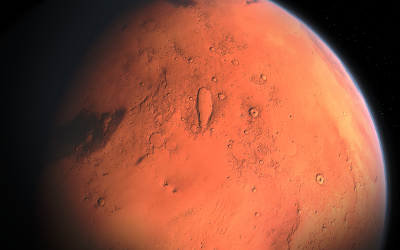Researchers find frost on the Solar System’s tallest volcanoes on Mars

Open University (OU) researchers are co-leads for instruments which have detected water-based frost at the top of the Olympus Mons volcanoes on Mars – the largest volcanoes in the Solar System.
The water frost was detected by the Colour and Stereo Surface Imaging System (CaSSIS) camera and the Nadir and Occultation for Mars Discovery (NOMAD) spectrometer instruments aboard the European Space Agency’s ExoMars Trace Gas Orbiter (TGO). The OU scientists from the School of Physical Sciences are deeply involved in both these instruments, co-leading the NOMAD instrument and supporting operations for the CaSSIS camera.
An international team, led by Dr. Adomas Valantinas who was based at the University of Bern, Switzerland, has published their findings in the journal Nature Geoscience. The findings of the study are unusual in that while such frosts have been detected on Mars previously, they have never been observed at such equatorial latitudes on the planet.
Professor Manish Patel, Professor of Planetary Science, Faculty of Science, Technology, Engineering & Mathematics at the OU, who leads the Atmospheric Research and Surface Exploration group involved in the CaSSIS and NOMAD instruments and this research, commented:
“These observations of water frost at such low latitudes are a fantastic visualisation of the water cycle on Mars. It isn’t always obvious that there is such a cycle on Mars, but much like the clouds in the atmosphere are a visual manifestation of the presence of water, the frost observed by CaSSIS and NOMAD at the surface is a visual reminder of the exchange of water between the surface and the atmosphere. Water is a key species for the Mars global climate, and also as a resource for future human and robotic exploration.”
A particularly pleasing aspect of this work was the way in which two different instruments on the TGO spacecraft were used to perform this study. The UK Space Agency fund the OU to perform operations and science analysis for both the CaSSIS and NOMAD instruments. Using these instruments together, CaSSIS was used to identify areas of potential water frosts through visual inspection, followed up by analysis of the reflected light by the NOMAD spectrometer to confirm the composition of the frost being water.
Dr Jon Mason, who leads the NOMAD and CaSSIS operations around Mars from the OU Interplanetary Space Operations Control area at the Walton Hall campus commented:
“Having spent time supporting the operation of the NOMAD and CaSSIS instruments around Mars since 2018, it is most excellent to see these images unlocking yet more new secrets around Mars. A large part of our operations tasks is to take the targets that the scientists in the team want to image, and program these observations into commands for the spacecraft. It’s fun taking photos through a camera that is many millions of kilometres away – and having the NOMAD observations alongside it nicely demonstrates the new science you can do when spaceflight instrument operations are combined.”
Professor Patel added:
“The ExoMars Trace Gas Orbiter continues to explore the martian surface and atmosphere and is still producing new and exciting scientific discoveries six years after it started science operations. Long may it live and prosper.”
This story was originally written by Laura Bandell and published on OU News.
You may also be interested in:
Contact our news team
For all out of hours enquiries, please telephone +44 (0)7901 515891
Contact detailsNews & articles

OU research model drives literacy transformation across São Paulo
A major state-wide literacy programme in Brazil is demonstrating how Open University research is informing public policy at scale, following its high profile presentation at BETT London 2026 by São Paulo’s Secretary of Education, Renato Feder.